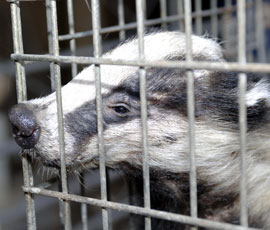Natural England offers first badger cull licence

Government officials remain “confident” that a pilot badger cull in England will begin within the next six weeks as details of the first provisional culling licence were announced.
Natural England, the government authority in charge of issuing culling licences, offered one provisional licence to west Gloucestershire on Monday (17 September).
A spokesman for Natural England said: “We have issued the licence for the west Gloucestershire area only. We aim to issue a similar provisional licence for west Somerset within the next few days.
“We still need to set minimum and maximum numbers of badgers that can be culled. The applicant still needs to agree with us specific dates during which culling will take place. They need to tell us who their main culling contractors are and they need to confirm with us that they have deposited sufficient funds to cover the costs of the cull over the four years.”
The spokesman stressed that no culling would be able to start “until these four boxes have been ticked”.
Farmers and licencees must fund the money for the four-year cull up front at a cost of £100,000 for each area. It is understood that this is delaying the application process as cash-strapped farmers, struggling in the recession, are thinking carefully before they commit to the cull.
In addition, part of the licence agreement will require farmers to pay more money if Natural England decides that more funds are required at any stage of the cull.
“The policy provides for a farmer-funded cull and we need certainty that the cull can go on for four years – if it doesn’t, it won’t be effective,” said a spokesman for Natural England.
“There is some reluctance to put the money forward because they are farming businesses. But we are giving them that certainty of a provisional licence.”
The first Gloucestershire licence is expected to be confirmed within the next two to four weeks, said Natural England. And at that stage, culling could begin immediately in that area.
The pilot will for run six weeks and it will involve “controlled shooting” (free shooting) of badgers. Trained marksmen, assisted by night-vision goggles or high-powered lamps will shoot badgers at night. Bait will be used to attract badgers above ground. A mixture of cage trapping and free shooting will be used.
Post-mortem examinations will be carried out on badger carcasses chosen at random.
An independent panel of experts will decide whether free shooting is “safe, effective and humane”.
The panel will produce an evaluation report after the first six week extensive cull in the pilot areas.
If the two pilot trials are successful, ministers will then decide whether culling will be rolled out more widely in up to 10 more areas in 2013.
The minimum number of badgers that can be culled in any area is at least 70% of the estimated badger population and the maximum number is below 100% “to prevent any risk of local extinction”, said a Natural England spokesman.
Badger population figures will be based on historical field work, a national badger survey, desk-based work and information from the applicants, as well as a new survey of the two pilot areas.
Culling will not be permitted during the following closed seasons: 1 December to 31 May for cage trapping and shooting badgers; 1 February to 31 May for controlled shooting; 1 December to 30 April for cage trapping and vaccination.
DEFRA said the badger cull was part of its wider bovine TB eradication programme, which also includes badger vaccination.
The pilot culls are not testing the science behind culling badgers, but just the method of free shooting. The previous Randomised Badger Culling Trial, undertaken during the last government, found that culling badgers reduced the incidence of bovine TB by 16%.
DEFRA officials are “confident” that the current pilot culls will provide evidence of at least a similar reduction in bovine TB. However, they said the full scientific results would not be known for about four years.
In a 300sq km culling area, DEFRA estimates that between 2,000 and 3,000 badgers would need to be removed during the four-year period for the trial to be successful.
However, if the cull is stopped during the four-year period, it could lead to a rise in bovine TB, officials have warned.
DEFRA said it has been in dialogue with the Bern Convention following an official complaint submitted by the Humane Society International UK, which argues that the cull will wipe out whole badger colonies in this country.
“They (the Bern Convention) have established that there is no significant concern about the likely impact on the badger population,” said a DEFRA spokesman.
“Therefore, we are not proposing to delay any further until that complaint is heard.”
DEFRA secretary Owen Paterson, who once tabled up to 600 parliamentary questions on bovine TB in one day, has signalled that the badger cull should go ahead as planned.
Last Tuesday (11 September), the Badger Trust lost its final bid to stop the cull when a panel of three judges sitting at the Court of Appeal ruled it could begin this autumn.
Visit our bovine TB page for more on the disease
